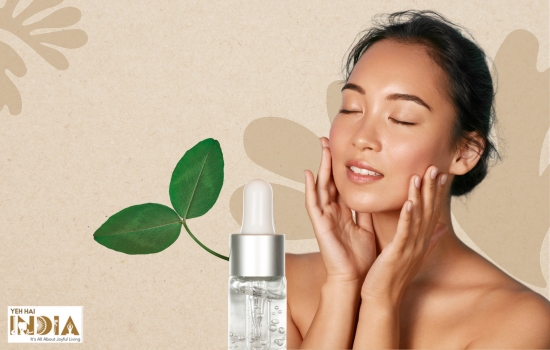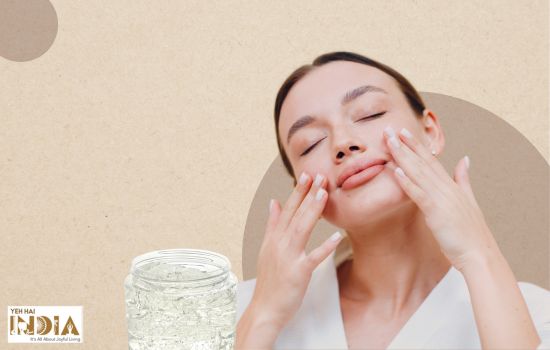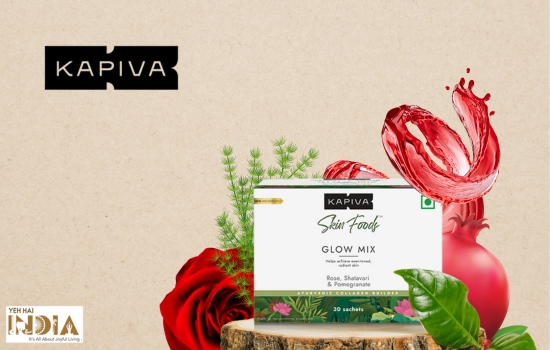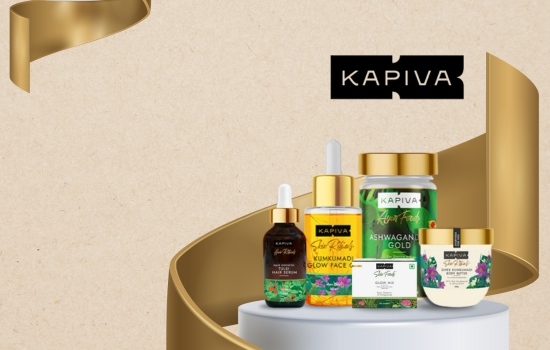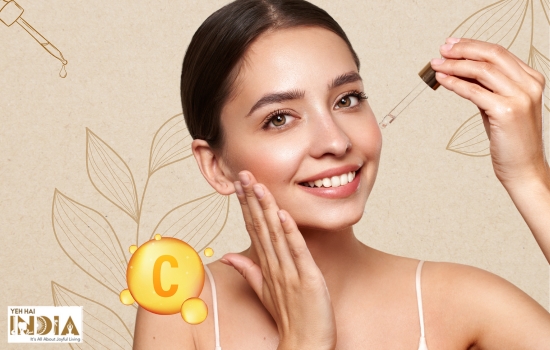The skincare sensation, Hyaluronic Acid (HA) is more popular in the world of skincare. This naturally occurring acid is known to add a dose of hydration, improve skin elasticity, and erase wrinkles with no potential side effects. You can find this ingredient in many Serums, Moisturizers, Eye creams, Sheet masks, and Fillers in the market.
But recently, HA became the talk of the town, and you can see many of your favourite Celebrities and Influencers actively use and talk about this ingredient. Is it worth the hype?
Read this article further and know everything about Hyaluronic acid.
Understanding Hyaluronic Acid
Chemically, HA is a complex carbohydrate molecule called glycosaminoglycan which can be found occurring naturally in the human body. It is most abundant in your skin and accounts for 50% of the total Hyaluronic acid in the body.
It is present in the layers of the eye, skin and all the tissues and fluids of the body. This acid is known for moisturizing the skin and helps to retain hydration in aged skin.
Different Formulations of HA
Hyaluronic acid is also known as Hyaluronan and Hyaluronate. It is available in 3 different types, Hydrolyzed hyaluronic acid, Sodium hyaluronate, and Sodium acetylated hyaluronate.
1. Hydrolyzed Hyaluronic Acid:
Hydrolyzed hyaluronic acid as the name suggests is formed when HA undergoes something called hydrolysis. This process breaks down the larger hyaluronic acid molecules into smaller fragments.
Properties: The hydrolyzed form is typically lighter in weight and has improved penetration properties. It can penetrate the skin more easily, which is beneficial for deeper hydration and may help improve skin texture.
Benefits: Hydrolyzed hyaluronic acid is often used in skincare products, particularly in serums, as it can provide better hydration and may have some anti-ageing benefits due to its smaller molecular size.
2. Sodium Hyaluronate:
Sodium hyaluronate is the sodium salt of hyaluronic acid. It is a derivative of hyaluronic acid and is often used in skincare and cosmetics.
Properties: It has a smaller molecular size than regular hyaluronic acid, which allows it to penetrate the skin more effectively. It also has a similar ability to retain moisture, making it a popular ingredient in moisturizers and serums.
Benefits: Sodium hyaluronate is commonly used in skincare products for its excellent hydrating properties, and it can help improve the skin’s moisture balance and overall appearance.
3. Sodium Acetylated Hyaluronate:
The end product formed when acetyl molecules are added to HA through a chemical process called acetylation is called sodium acetylated hyaluronate.
Properties: This form of hyaluronic acid is often used in cosmetics for its enhanced stability and water-binding capacity. It can help maintain moisture on the skin’s surface.
Benefits: It hydrates, reduces signs of ageing such as fine lines and wrinkles and even enhances the skin texture on regular use. Hence it is a popular ingredient in moisturisers and serums.
When HA is broken down into small elements, it easily penetrates the different layers of skin. This type is known as Hydrolyzed hyaluronic acid and is best suited for oily and combination skin.
If you have normal skin, Sodium hyaluronate is best for you. It can go deeper into your skin and offers the required hydration without overdoing it. This type of HA is available in serums.
The final type, Sodium acetylated hyaluronate is more like the second type but with long-lasting effects. So, If you have dry skin or live in dry climates, this type of HA works best for you. So, based on your skin type, it is better to choose the type that suits you.
Recommended Article: Skin Benefits of Tea Tree Oil and Best Products Available
The Hype Surrounding Hyaluronic Acid
Being one of the popular ingredients in the Skincare world, Hyaluronic Acid is highly endorsed by Celebrities and Influencers on Instagram, TikTok, and YouTube.
It is popularly known as the ‘Fountain of Youth’ as it provides deep moisturization to the skin. As HA is known to improve hydration and is effective for all skin types, it is worth the hype.
How does Hyaluronic Acid work?
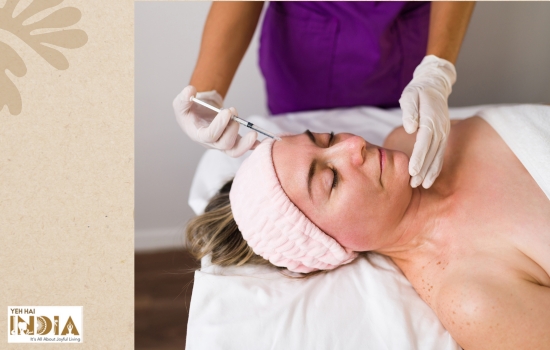
Hyaluronic acid, a primary constituent of the extracellular matrix, is present in various human tissues, including the skin, eyes and connective tissue. Its remarkable anionic properties enable it to attract and retain moisture, resulting in increased volume and structural support.
The natural ageing process results in reduced production of both hyaluronic acid and collagen in the skin, leading to the development of wrinkles as the skin loses its viscoelastic qualities.
Products containing hyaluronic acid are employed to combat the effects of ageing by restoring lost volume. Furthermore, research suggests that hyaluronic acid fillers may stimulate collagen production and influence the morphology of fibroblasts.
Cosmetic Application of Hyaluronic Acid
Hyaluronic acid (HA) is widely used in the cosmetic industry for various applications due to its remarkable ability to retain moisture and provide hydration. Here are some common cosmetic applications of hyaluronic acid:
Dermal Fillers:
One of the most well-known cosmetic applications of hyaluronic acid is in dermal fillers. These injectable fillers contain a gel-like form of hyaluronic acid and are used to restore volume, fill in wrinkles and fine lines, and enhance facial features.
Popular brands of hyaluronic acid fillers include Restylane, Juvederm, and Belotero.
Topical Skincare Products:
Many skincare products, including serums, creams, and moisturizers, contain hyaluronic acid. These products are designed to provide hydration to the skin, reduce dryness, and improve overall skin texture.
HA in these products acts as a humectant, drawing in and holding water to keep the skin well-hydrated.
Lip Fillers:
In addition to facial fillers, hyaluronic acid is often used in lip fillers to enhance lip volume and shape. These injections can provide natural-looking results and are a popular choice for lip augmentation.
Mesotherapy:
Mesotherapy is a minimally invasive cosmetic procedure that involves injecting a mixture of nutrients, vitamins, and hyaluronic acid beneath the skin. This treatment is used to rejuvenate the skin, improve texture, and reduce the appearance of fine lines and wrinkles.
Eye Creams and Treatments:
Eye creams and treatments often contain hyaluronic acid to address issues like under-eye bags, puffiness, and dark circles. HA helps hydrate the delicate skin around the eyes, making it appear smoother and more youthful.
Facial Masks:
Sheet masks and facial masks with hyaluronic acid are used to provide an intense boost of hydration to the skin. These masks can be especially helpful for individuals with dry or dehydrated skin.
Serum Boosters:
Hyaluronic acid serum boosters are designed to be added to your existing skincare routine. They provide a concentrated dose of HA to enhance the hydrating effects of your regular skin care products.
Primer and Foundation:
Some makeup primers and foundations contain hyaluronic acid to create a smoother, more even canvas for makeup application. HA helps to hydrate the skin, making it more receptive to makeup.
Setting Sprays:
Setting sprays with hyaluronic acid can be used to set makeup and provide a refreshing, hydrating mist to the skin. These sprays help maintain makeup longevity while keeping the skin hydrated.
Debunking the HA Myths
When an ingredient is the talk of the town, several misconceptions spread along with its goodness. If you use HA to exfoliate dead skin, then stop using it. It is an acid with low pH, so it doesn’t provide you with the exfoliating properties like other exfoliants.
And never think it only works for dry skin. It is ideal for every skin type and helps to maintain skin pH and boosts hydration.
The amount of HA will not be the same throughout your life. As you age, the HA in your body decreases. So, it is wise to use products with this ingredient to prevent the signs of ageing.
It is also believed that both HA and Sodium hyaluronate are the same. But you should know that Sodium hyaluronate is better than HA in providing long-lasting effects.
Side Effects of Hyaluronic Acid
When an ingredient offers an immense amount of benefits, it is common to think about the potential side effects of it. The word ‘Acid’ always triggers some kind of fear in our mind. But, when it comes to this holy ingredient, you need not worry about it. It doesn’t have any history of causing trouble to the skin.
When you experience some negative experiences like rashes, it is probably because of the preservatives and other ingredients of the product. Apart from this, overuse of HA may sometimes trouble your skin.
Another crucial thing to take care of is the concentration of this acid. Your product should never contain more than 2% of the recommended amount. And always remember the traditional rule of patch testing before use.
What to look for in a product?
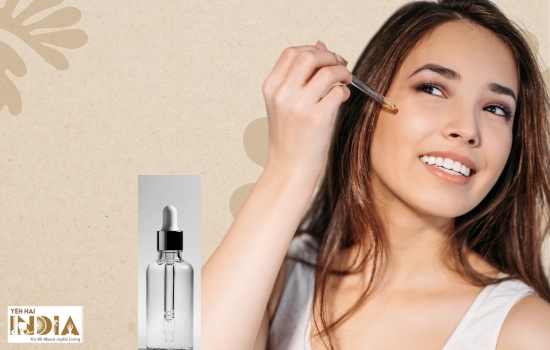
HA is available in several Serums, Sheet masks, Eye creams, Moisturizers, Cleansers, and Lip treatments. So, choosing the right product with this ingredient is often a daunting process.
When choosing a product, always look for Hydrolyzed hyaluronic acid, Sodium acetylated hyaluronate, and Sodium hyaluronate in the ingredients list.
Apart from this, check for ingredients that are allergic to you and also avoid if it has fragrances.
It is also better to look for the molecular weight of the acid. Products with lower molecular weight can penetrate the skin much more easily. So, prefer this kind of product when available.
You can also look for complementary ingredients such as Vitamin C, Vitamin B5, Ceramides, Retinol, AHAs & BHAs.
Compatibility:
Most Skin Types: HA is typically suitable for all skin types, including sensitive, dry, oily, and combination types. It is well-tolerated and rarely causes allergic reactions.
Dehydrated or Dry Skin: HA is particularly beneficial for individuals with dehydrated or dry skin, as it helps to lock in moisture and keep the skin hydrated.
Ageing Skin: HA is often used in anti-ageing skincare products because of its ability to plump the skin and reduce the appearance of fine lines and wrinkles.
Acne-Prone Skin: HA is non-comedogenic, meaning it doesn’t clog pores. Individuals with acne-prone skin can use it to provide hydration without exacerbating breakouts.
Post-Procedure Skincare: Dermatologists often recommend HA for post-procedure skincare, as it can help soothe and hydrate the skin after treatments like chemical peels or laser therapy.
Incompatibility:
1. Allergic Reactions:
While rare, some individuals may be allergic to hyaluronic acid. If you experience redness, itching, swelling, or a rash after using a product containing HA, discontinue use and consult a dermatologist.
2. Overuse:
Using too much HA can potentially lead to an adverse reaction. It’s important to follow product instructions and not to overuse HA-containing products.
3. Inappropriate Formulations:
HA can be used in a variety of formulations, such as serums, creams, and gels. Choosing the wrong formulation for your skin type can result in compatibility issues. For example, a heavy HA cream may not be suitable for oily skin.
4. Incorrect Layering:
When using multiple skincare products, the order of application matters. Applying HA after an oil-based product, for example, may reduce its effectiveness because oil can create a barrier that hinders HA absorption.
5. External Factors:
Some external factors, such as extreme weather conditions or excessive dryness, can affect HA’s performance. In very dry climates, for instance, HA may not be as effective at retaining moisture.
It’s important to perform a patch test when trying a new HA product, especially if you have sensitive or allergy-prone skin. Apply a small amount to a discreet area of skin, like your inner forearm, and wait for 24-48 hours to check for any adverse reactions.
If you have concerns or specific skin conditions, consult a dermatologist for personalized advice on using hyaluronic acid in your skincare routine.
Final Thoughts
In the world of several skincare ingredients, Hyaluronic acid has captured unique attention with its marvellous benefits. With its power to attract molecules, it boosts hydration, reduces age signs, smooths skin texture, and improves skin elasticity.
While buying any products with HA, always look out for any allergens, molecular weight, and other complementary ingredients like Vitamin C, Vitamin B5, Ceramides, etc. The above-mentioned products have no more than 2% of Hyaluronic acid and are safe for your skin. And yes, Hyaluronic acid comes with a lot of goodness, and it is worth the hype.
Frequently Asked Questions
Q: Is Hyaluronic Acid worth the hype?
Yes. Hyaluronic acid is indeed worth the hype as it offers top benefits like hydrating skin, preventing signs of ageing, smooth skin texture, etc.
Q: Do dermatologists recommend hyaluronic acid?
Yes, dermatologists often recommend Hyaluronic acid to combat dry skin, ageing signs, and other skin conditions.
Q: Can a 22-year-old use hyaluronic acid?
Of course! A 22-year-old can add hyaluronic acid to their skincare regimen.
Q: Which skin type suits hyaluronic acid?
As Hyaluronic acid is noted for its hydrating properties, this acid is best suited for dry and dehydrated skin.
Recommended Article: Kumkumadi Tailam – 7 Magical Products for Your Skin!


